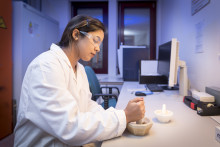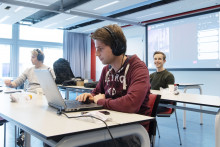‘We aren’t having discussions for the sake of discussions, but to see the output having an impact and being heard’, said FFNT board member, Valia Drakou, who hosted the session together with Rosa Aguilar, Laura Cordova, Saskia Lindhoud, and Professor Hans Hilgenkamp.
The pandemic appears to be especially challenging for people with children who find themselves in unforeseen circumstances of juggling work and private life within the same four walls. ‘You might succeed as an academic and still fail as a parent’, warned Saskia Lindhoud, Assistant Professor at the TNW Molecular Nanofabrication group. While Aguilar clarified that combining family duties with job obligations is a matter that is ‘not exclusive to women, but parents in general’, the gendered nature of the pandemic should not be put aside, as the level of constraints appear to impact women on a larger scale compared to the male counterparts.
Covid-19 and equality
While scientists and researchers across the globe have called for equality in academia, the Covid-19 pandemic managed to set foot in the gender gap and cause it to widen even more. Across 2020, researchers reported a higher rate of paper submissions coming from male researchers while female submissions appeared to drop significantly. Developments such as these sparked the FFNT to host a discussion about the impact of the Covid-19 pandemic on women in academia, both in and outside of the UT.
Lasting Impact
It is important for both the scientific community as well as the UT to create a system of support in a situation which is disadvantageous for the already vulnerable position of women in academia, according to Hilgenkamp. ‘Our educational system is incredibly competitive. If you have to juggle your time, you will be disadvantaged. I hope that Covid causes the structures to be reorganized towards more representation for women and minorities.’
Human beings behind the computer
Throughout the discussion it became apparent that the UT should enable an active environment of support and community feeling. ‘There are human beings behind the computer, not only employees,’ Cordova added. ‘This is important not only on the grounds of gender, but for all minorities as well.’
While discussing potential points of improvement, a call for transparency from the UT derived in order to reduce unclarities and uncertainties in regards to lab accesses, workspace availability, as well as the UT’s strategy and vision. ‘There is some wonderful support in place already, but the communication needs to be clearer,’ stated a member from the audience. ‘This could happen through the means of for example a Buddy program for staff members as well as a training for female employees to tackle gender-bound behaviour.’
Bridging the gap
The shared experiences once more revealed the need of the UT to actively tackle matters of gender inequality and to create an environment of support and empowerment as the gender gap can only be bridged through active involvement from all sides.
‘However, the crisis has its upsides. We don’t ask “How many articles did you publish last month?”, but we ask “How are you? Are you okay?”’, says a member from the audience. Lindhoud agreed: ‘This is the right time to reorganize our systems and to see what we can change.’








